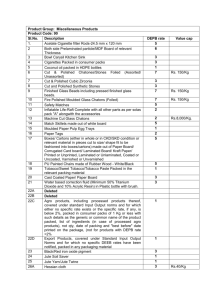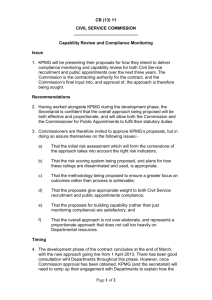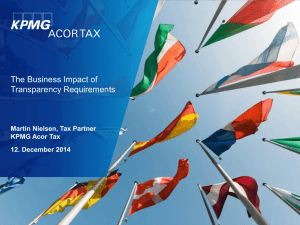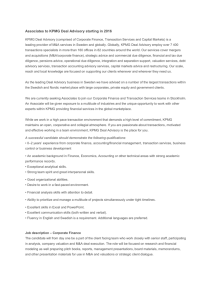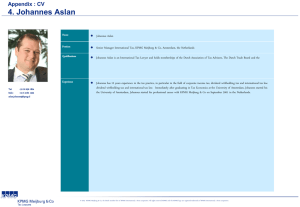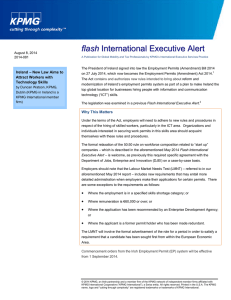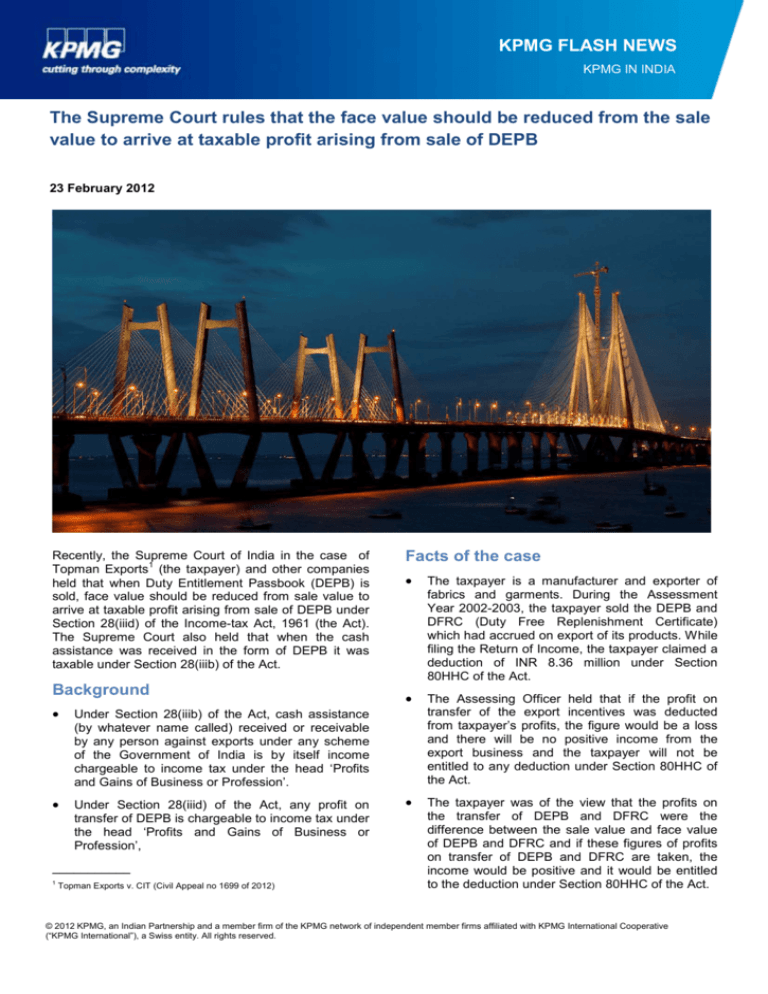
KPMG FLASH NEWS
KPMG IN INDIA
The Supreme Court rules that the face value should be reduced from the sale
value to arrive at taxable profit arising from sale of DEPB
23 February 2012
Recently, the Supreme Court of India in the case of
1
Topman Exports (the taxpayer) and other companies
held that when Duty Entitlement Passbook (DEPB) is
sold, face value should be reduced from sale value to
arrive at taxable profit arising from sale of DEPB under
Section 28(iiid) of the Income-tax Act, 1961 (the Act).
The Supreme Court also held that when the cash
assistance was received in the form of DEPB it was
taxable under Section 28(iiib) of the Act.
Facts of the case
•
The taxpayer is a manufacturer and exporter of
fabrics and garments. During the Assessment
Year 2002-2003, the taxpayer sold the DEPB and
DFRC (Duty Free Replenishment Certificate)
which had accrued on export of its products. While
filing the Return of Income, the taxpayer claimed a
deduction of INR 8.36 million under Section
80HHC of the Act.
Background
•
The Assessing Officer held that if the profit on
transfer of the export incentives was deducted
from taxpayer’s profits, the figure would be a loss
and there will be no positive income from the
export business and the taxpayer will not be
entitled to any deduction under Section 80HHC of
the Act.
•
The taxpayer was of the view that the profits on
the transfer of DEPB and DFRC were the
difference between the sale value and face value
of DEPB and DFRC and if these figures of profits
on transfer of DEPB and DFRC are taken, the
income would be positive and it would be entitled
to the deduction under Section 80HHC of the Act.
•
Under Section 28(iiib) of the Act, cash assistance
(by whatever name called) received or receivable
by any person against exports under any scheme
of the Government of India is by itself income
chargeable to income tax under the head ‘Profits
and Gains of Business or Profession’.
•
Under Section 28(iiid) of the Act, any profit on
transfer of DEPB is chargeable to income tax under
the head ‘Profits and Gains of Business or
Profession’,
___________
1
Topman Exports v. CIT (Civil Appeal no 1699 of 2012)
© 2012 KPMG, an Indian Partnership and a member firm of the KPMG network of independent member firms affiliated with KPMG International Cooperative
(“KPMG International”), a Swiss entity. All rights reserved.
Issues before the Supreme Court
•
Whether the face value of the DEPB shall be deducted
from the sale proceeds to calculate profits chargeable
under Section 28(iiid) of the Act?
•
Whether the face value of the DEPB is chargeable
under Section 28(iiib) of the Act?
•
DEPB is ‘cash assistance’ receivable by a person
against exports under the scheme of the
Government of India and falls under Section
28(iiib) of the Act. Accordingly, DEPB is
chargeable to income tax under the head ‘Profits
and Gains of Business or Profession’ even before
it is transferred by the taxpayer.
•
Under Section 28(iiid) of the Act, any profit on
transfer of DEPB is chargeable to income tax
under the head ‘Profits and Gains of Business or
Profession’ as an item separate from cash
assistance under Section 28(iiib) of the Act.
•
As DEPB has direct nexus with the cost of imports
for manufacturing an export product, any amount
realized by the taxpayer’s over and above the
DEPB on transfer of the DEPB would represent
profit on the transfer of DEPB.
•
The face value of the DEPB will fall under Section
28(iiib) of the Act, the difference between the sale
value and the face value of the DEPB will fall
under Section 28(iiid) of the Act. Accordingly, the
difference between the sale value and the face
value of the DEPB represent profit on transfer of
the DEPB.
•
The cost of acquiring DEPB is not nil because the
person acquires it by paying customs duty on the
import content of the export product and the DEPB
which accrues to a person against exports has a
cost element in it.
Taxpayer’s contentions
•
The object of granting DEPB to an exporter is to
neutralize the incidence of custom duties which has
been incurred on the import component of the export
product and this neutralization is achieved by grant of
duty credit of the amount specified in the DEPB
Scheme. Therefore there was direct relation between
the DEPB and the cost of inputs imported for
manufacture of export product.
•
If the intention of the legislature was to cover the entire
sale proceeds arising on transfer of DEPB under
Section 28(iiid) of the Act, then they would have used
the expression ‘sale proceeds’ instead of ‘profit on
transfer of DEPB’.
•
If the entire sale proceeds of the DEPB is treated as
profits arising on transfer of DEPB, then the taxpayer
will be taxed twice for the same income, once as ‘cash
assistance’ under Section 28(iiib) of the Act equivalent
to the face value of the DEPB and for the second time
as profit on transfer of DEPB under Section 28(iiid) of
the Act.
Tax department’s contentions
•
The taxpayer does not obtain any cost in obtaining the
DEPB. DEPB is an export incentive granted by the
Government under DEPB Scheme and it has no direct
relation with the cost of purchases made by the
taxpayer.
•
The taxpayer is not entitled to deduct the face value of
the DEPB from the sale proceeds for determining the
profit arising on transfer of DEPB. Accordingly, the
entire sale proceeds of the DEPB represent the profits
earned by the taxpayer on transfer of the DEPB.
Our comments
This is an important ruling by the Supreme Court
where it has held that the entire amount received on
the sale of DEPB does not represent profits
chargeable under Section 28(iiid) of Act. For
calculating profits, the sale value of the DEPB has to
be reduced by its face value.
Section 80HHC of the Act has been omitted from AY
2005-06. Accordingly, the decision of the Supreme
Court would be relevant for the pending cases.
Supreme Court ruling
•
Objective of DEPB is to neutralise the incidence of
customs duty on the import content of the export
products. Hence, it has direct nexus with the cost of the
imports made by an exporter for manufacturing the
export products. The cost of customs duty is neutralised
under the DEPB scheme, by granting a duty credit
against the export product and this credit can be utilised
for paying customs duty on any item which is freely
importable.
© 2012 KPMG, an Indian Partnership and a member firm of the KPMG network of independent member firms affiliated with KPMG International Cooperative
(“KPMG International”), a Swiss entity. All rights reserved.
www.kpmg.com/in
Ahmedabad
Safal Profitaire
B4 3rd Floor, Corporate Road,
Opp. Auda Garden, Prahlad Nagar
Ahmedabad – 380 015
Tel: +91 79 4040 2200
Fax: +91 79 4040 2244
Hyderabad
8-2-618/2
Reliance Humsafar, 4th Floor
Road No.11, Banjara Hills
Hyderabad 500 034
Tel: +91 40 3046 5000
Fax: +91 40 3046 5299
Bangalore
Maruthi Info-Tech Centre
11-12/1, Inner Ring Road
Koramangala, Bangalore 560 071
Tel: +91 80 3980 6000
Fax: +91 80 3980 6999
Kochi
4/F, Palal Towers
M. G. Road, Ravipuram,
Kochi 682 016
Tel: +91 484 302 7000
Fax: +91 484 302 7001
Chandigarh
SCO 22-23 (Ist Floor)
Sector 8C, Madhya Marg
Chandigarh 160 009
Tel: +91 172 393 5777/781
Fax: +91 172 393 5780
Chennai
No.10, Mahatma Gandhi Road
Nungambakkam
Chennai 600 034
Tel: +91 44 3914 5000
Fax: +91 44 3914 5999
Delhi
Building No.10, 8th Floor
DLF Cyber City, Phase II
Gurgaon, Haryana 122 002
Tel: +91 124 307 4000
Fax: +91 124 254 9101
Kolkata
Infinity Benchmark, Plot No. G-1
10th Floor, Block – EP & GP,
Sector V Salt Lake City,
Kolkata 700 091
Tel: +91 33 44034000
Fax: +91 33 44034199
Mumbai
Lodha Excelus, Apollo Mills
N. M. Joshi Marg
Mahalaxmi, Mumbai 400 011
Tel: +91 22 3989 6000
Fax: +91 22 3983 6000
Pune
703, Godrej Castlemaine
Bund Garden
Pune 411 001
Tel: +91 20 3050 4000
Fax: +91 20 3050 4010
The information contained herein is of a general nature and is not intended to address the circumstances of any particular individual or entity. Although we
endeavour to provide accurate and timely information, there can be no guarantee that such information is accurate as of the date it is received or that it will continue
to be accurate in the future. No one should act on such information without appropriate professional advice after a thorough examination of the particular situation.
© 2012 KPMG, an Indian Partnership and a member firm of the KPMG network of independent member firms affiliated with KPMG International Cooperative
(“KPMG International”), a Swiss entity. All rights reserved.
The KPMG name, logo and “cutting through complexity“ are registered trademarks of KPMG International Cooperative (“KPMG International”), a Swiss entity.
© 2012 KPMG, an Indian Partnership and a member firm of the KPMG network of independent member firms affiliated with KPMG International Cooperative
(“KPMG International”), a Swiss entity. All rights reserved.

